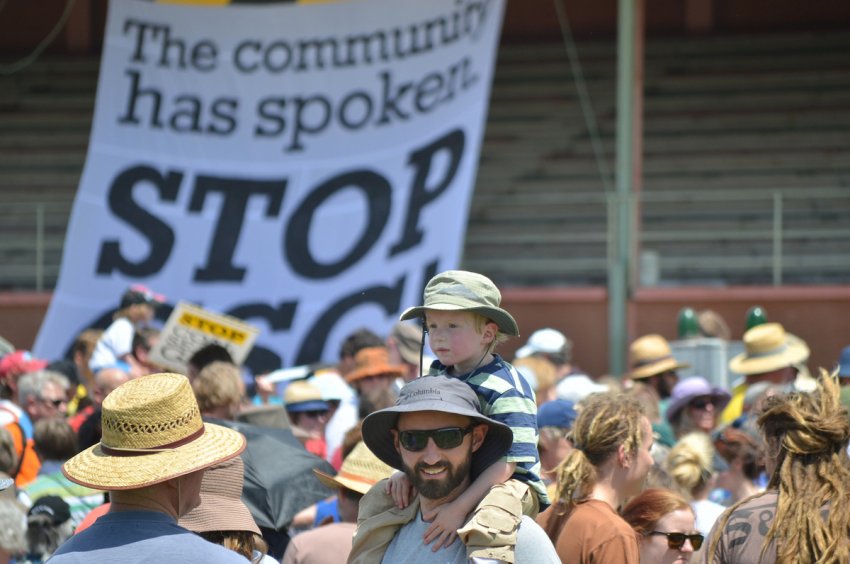
The arrest on February 6 of an Indigenous elder and another Githabul traditional owner on a coal seam gas (CSG) blockade should act as a siren call to all those concerned about our future.
They were arrested along with farmers and other Lock the Gate campaigners for mounting a blockade at Doubtful Creek in northern NSW to stop CSG company Metgasco carrying out test drills.
Significant parts of the Eden Creek State Forest were handed back to the Githabul people in 2007. But on February 4, the NSW police declared a section of the forest “closed” to stop others joining the blockade.
These are just some of the battle lines in the David and Goliath war unfolding across NSW.
The community response to CSG mining has taken the industry and the NSW state government by surprise. Unprepared for the community’s reaction to the drilling, Premier Barry O’Farrell's government has deployed the riot squad, the NSW Emergency Services and even the Rural Fire Authority to help Metgasco get its drill equipment on the site.
But this ham-fisted backlash is backfiring.
Rather than deter protesters, the blockades at Glenugie during January, and now Doubtful Creek, are growing. Lynette Eggins from Clarence Alliance Against CSG said: “Community resistance is now a reality, 365 days a year.”
This community resistance cannot be dismissed by politicians as out-of-work students and “greenies”. It involves farmers and “townies”, and it’s not uncommon for entire families to join the blockade lines.
This is because people in regional areas understand the disastrous impacts of unconventional gas mining on water tables and water supplies, and the industry’s dangerous methods of extraction and inadequate disposal of waste. In these areas, agriculture is a staple and communities know that water is their life blood. Many also understand that there are sustainable energy alternatives – and that CSG isn’t one of them.
A non-partisan campaign
Exploration for CSG has been taking place in northern NSW since the early 2000s. Most of the region is covered by petroleum exploration licences and applications.
But communities have swung into action amid widespread and growing awareness of the damage the unconventional gas industry has caused in the US and Queensland.
In just two years, some 20 community groups in the Northern Rivers area have sprung up to fight to protect land and water from CSG mining. At least 70 communities have declared themselves CSG-free zones.
The community-driven campaigns against CSG in northern NSW and the Illawarra have been among the most inspiring in Australia. Tens of thousands of people have taken to the streets and mobilised in dramatic displays of opposition to CSG mining.
A key reason for this has been the non-party political nature of these campaigns.
To stop the rollout of the CSG industry, the anti-CSG movement has to include everyone who wants to fight it – irrespective of political background. This was the case in the successful campaign that stopped Dart Energy drilling in St Peters, just seven kilometres from Sydney’s CBD.
This should also be the case for the battle on a new frontline – south-west Sydney.
The CSG goliath is flexing its muscles where there is little knowledge about the industry and its consequences. The main arguments are that it will provide jobs and that CSG is a cleaner fuel than coal.
A community networking meeting hosted by Stop CSG Sydney on February 3, which had about 25 groups fighting CSG across NSW, resolved to share experience and resources with south-west Sydney residents fighting AGL Energy.
South-west Sydney the new battle line
The focus of the fight against CSG mining in Sydney has now shifted to the south-west. AGL has been pushing to expand its Camden Gas Project to cover Ingleburn and surrounds, halfway between Campbelltown and Liverpool.
This densely populated area is home for 22,000 people. AGL wants to sink gas wells fewer than 200 metres from people's homes, with gas pipelines running under houses, schools and shops. If this is allowed to happen, the health and environmental consequences could be terrifying.
Some local councils are planning awareness-raising campaigns.
But, in an unexpected move, AGL said on February 9 that it was “suspending” plans to expand its Camden project. This is a small, but important, victory in the fight against CSG.
The communities, however, are not suspending their campaign against CSG mining.
Coal seam gas is shaping into a critical election issue. Candidates from all parties – especially those standing in the marginal seats of south-west Sydney – will want to persuade people of their precautionary approach to the CSG industry.
O’Farrell is facing a split in his ranks. The NSW ALP has reversed its pro-CSG position, but its federal counterparts have not.
Nevertheless, the federal Labor government is feeling the pressure. Federal environment minister Tony Burke said on February 6 he would look into more regulation of the CSG industry in the states, and he vowed to investigate the speed at which the NSW O’Farrell government has re-issued CSG licences.
Independent MP Tony Windsor has pressured Labor to rein in the CSG industry, particularly regarding water use. Windsor also wants the federal government to have more power to intervene in state assessments of projects.
It’s a sign of the strength of the community campaign thus far that this is even happening. To keep up the pressure, however, we cannot let the movement against CSG become tied to the fortunes of any political party or figure – election year notwithstanding.